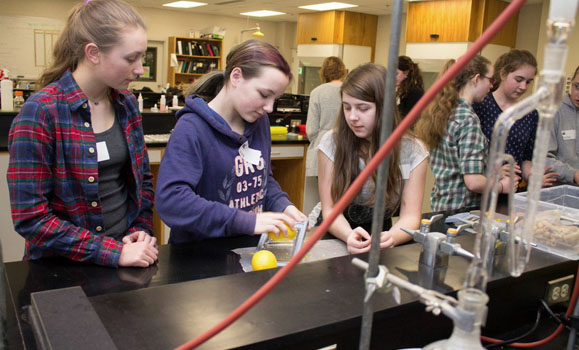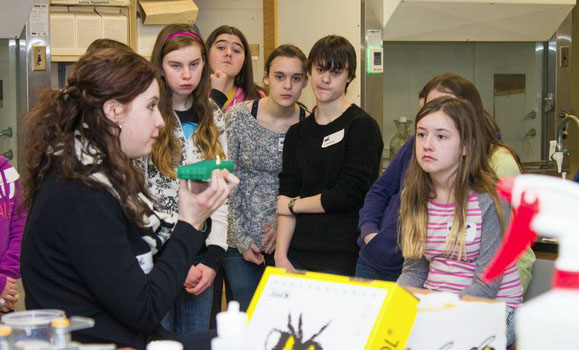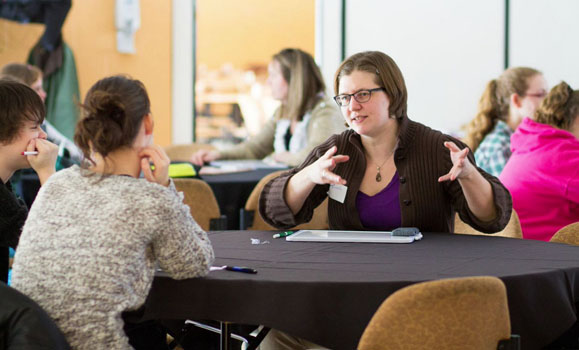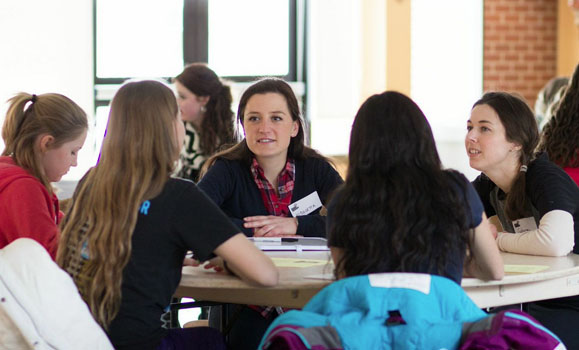More than 30 junior high girls from Truro and surrounding areas — some from as far as Halifax and Amherst — attended the first Girls Get Wise science retreat last Saturday on Dal’s Agricultural Campus, hosted by the Female Leaders in Academia (FLIA) group.
The retreat welcomed girls from grades 7-9 and featured hands-on experiments as well as mentorship sessions with female professors and graduate students.
Girls Get Wise is a program that exposes students to STEM fields- science, technology, engineering and math. Girls Get Wise events are held at different campuses and feature day-long retreats as well as summer events. Girls have the opportunity to interact with professors and scientists in various STEM fields.
This was the first Girls Get Wise event to be held at the Faculty of Agriculture. The event was initiated by Sarah Stewart-Clark, an aquaculture professor and leader of the FLIA group on campus.
Discovering science
One experiment during the retreat focused on essential oil extraction from citrus fruits such as lemons and oranges. Essential oils, found naturally in many fruits and plants, are used in everyday products like bug repellent, mouthwash and perfume. The girls prepared lemon and orange peel samples and then performed a distillation to extract the essential oils. Once the distillation was complete, the students were able to take home a sample of the extract, which smelled like either orange or lemon.

Nicoletta Faraone and Sabrina Mace, both post-doctoral fellows working in organic chemistry and microbiology, respectively, led the essential oil extraction experiment.
“I really enjoyed being a part of this event,” said Dr. Faraone. "The main goal was to inspire young females using our personal stories and experiences in science. We wanted to send an important message: always be curious and excited about what is happening around you!”
Dr. Mace, who is originally from France, also enjoyed the Girls Get Wise event. “It was great to observe that such young girls were already interested in science. It was wonderful to interact with them, share my experience in Canada, and present to them the many opportunities that science can open up to us.”
The remaining extracted essential oil was fed to bumble bees as part of a feeding assay. The students interacted with live bumble bees and observed behaviour from the bees as they came into contact with the essential oils, mixed with a sugar syrup.

Rachel Rix, a Masters of Science student, explained to the students the university’s ongoing research with bees and her work in toxicology.
“I want the girls to see the diversity of things we study, and how much of what we do is connected”, explained Rix. “One thing I have learned in my training as a scientist is that because of how diverse our research can be, we can incorporate many of our interests into what we study. I really want the girls to know that they will never have to feel limited in science and engineering.”
Yet another session within the experiment dealt with native pollinators and their importance to food production. The students learned about bee anatomy, as well as their conservation. Many students were already growing pollinator- friendly gardens at home.
From bees to aquaculture
The other experiment of the day highlighted the Faculty of Agriculture’s Aquaculture Centre.
Students learned about crustacean health and biology using lobsters. Students were able to study the anatomy of lobsters, perform a health assessment and collect blood samples. The experiment finished with a dissection of the lobsters, a huge hit with students interested in biology.
“I am excited to be here today because I like science,” said Maria, a grade 8 student from Pugwash. “I participate in science fairs at school and like doing experiments.”
Alicia, a grade 7 student from Thorburn, agreed. “My science teacher told me about this event and said it would be super fun — and it is!”

The science retreat finished with a mentorship hour. Groups of students received one-on-one time with female professors and graduate students, switching every ten minutes to a different mentor.
The girls were able to ask questions, such as why the mentors got involved in science and how they chose their career paths.
“I hope these events help young girls who are interested in sciences and engineering to not be afraid to pursue their passions,” explained Rix. “These girls see that they are not alone in their interests. I hope we can further our work in the local community through outreach activities.”
Dr. Faraone is looking forward to what lies ahead. “I hope to see more scientific events which involve not only schools but also people from the Agricultural Campus and our Halifax campuses. I truly believe that we need to make our voices heard with scientific activities and social events, and also involve men in our programming.”


